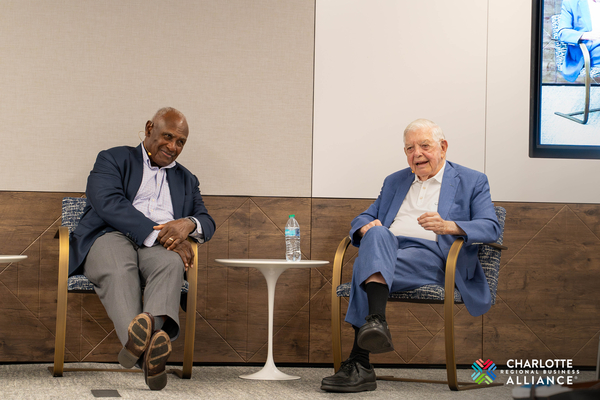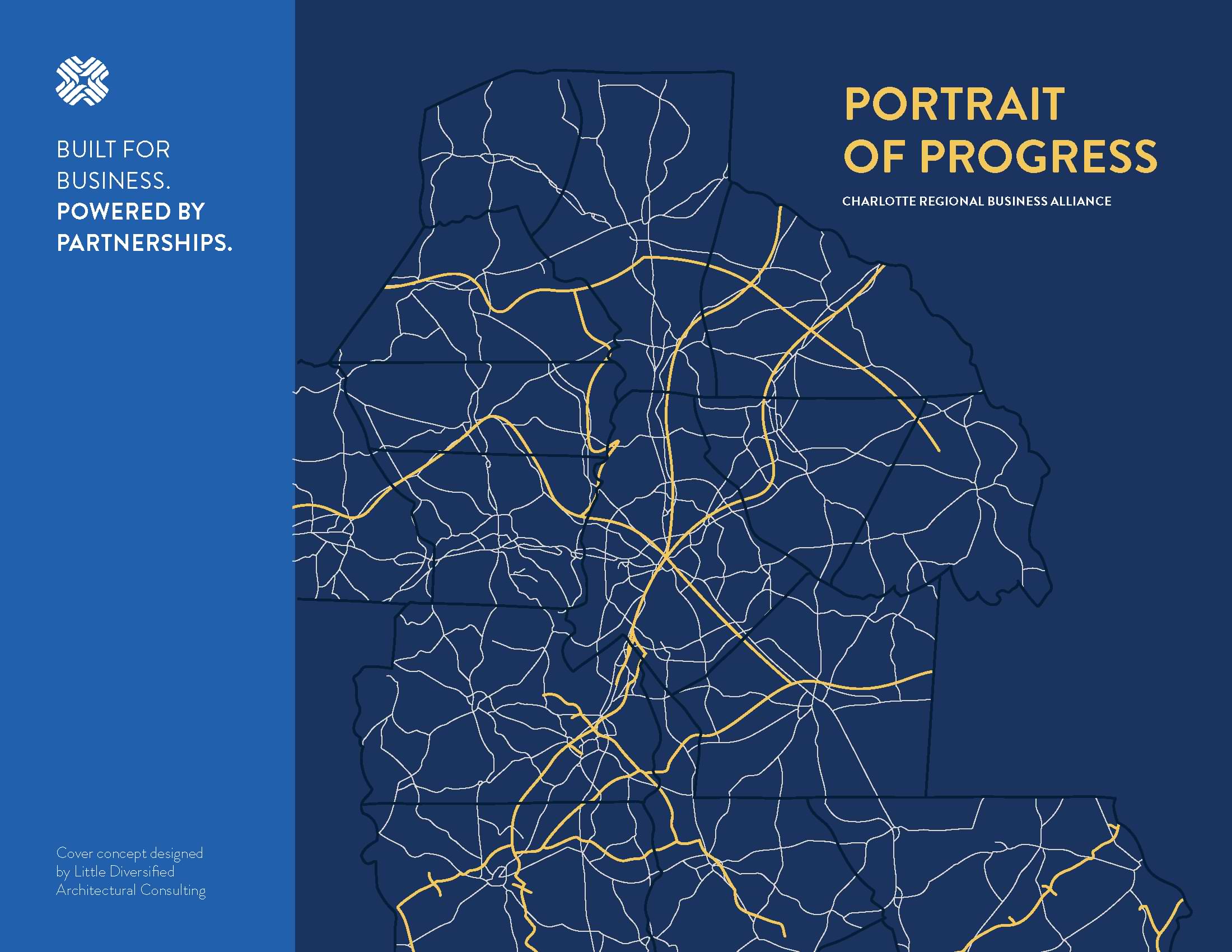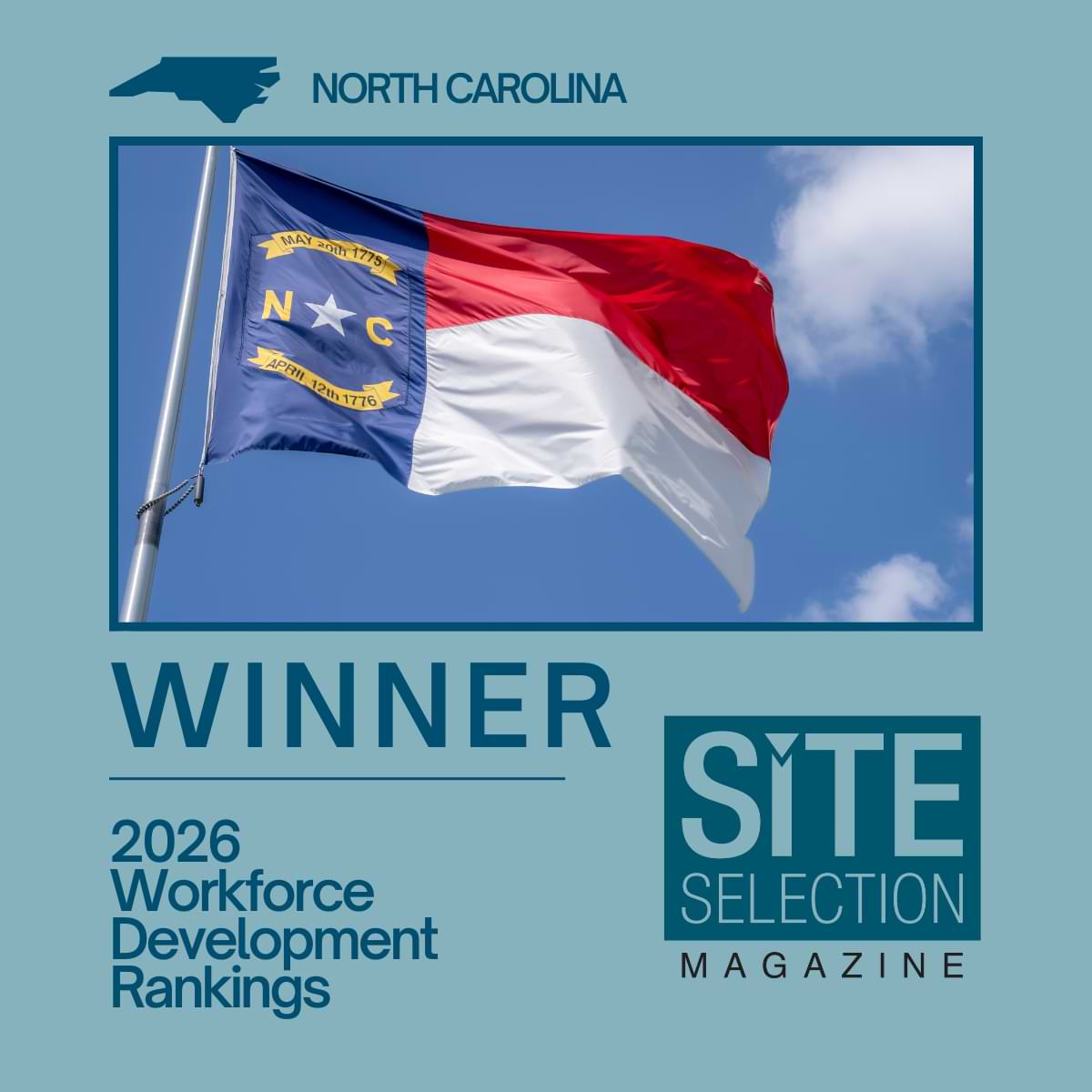The Charlotte Region has grown and changed exponentially since it first came to be. For what they say was the last time, prominent Charlotte figures Hugh McColl and Harvey Gantt reflected on their work to shape Charlotte and shared their visions for its future.
The pair spoke Tuesday at the Charlotte Regional Business Alliance’s Investor Quarterly Meeting hosted by CBI | Workplace Solutions. CLT Alliance Interim President and CEO Andrea Smith led the conversation.
In the audience were business leaders from across the Charlotte Region, including Charlotte Mayor Vi Lyles and Mecklenburg County Manager Dena Diorio.
Beginnings
Smith asked both men how they ended up in Charlotte.
“I was notorious,” Gantt began.
Gantt, who graduated from Clemson University and was the school’s first Black student, said at first, no architecture firm in Charlotte wanted to hire him.
That led him to Arthur “Gouldie” Odell, whose 1968 city plan made Uptown Charlotte what it is today. Odell hired Gantt and taught him the business, giving him the chance to work on the master plan.
“I wanted to use design to convince often recalcitrant leaders to help move this city ahead,” Gantt said of his role.
McColl said he grew up thinking he would run his family business in cotton or follow his father into banking. He went to the University of North Carolina and then Marine Corps before his family sent him to Charlotte. He said his grades weren’t great in college so that left him with fewer options.
At his first job at a local bank, McColl said he was making $12.50 per day. It took eight days to make $100.
McColl eventually rose to CEO as the bank later became North Carolina National Bank, then NationsBank, and finally, Bank of America.
The pair said they met around 1971 or 1972 while both were working to build a better future for Charlotte.
In 1983, Harvey Gantt ran for mayor. That same year, Hugh McColl became chairman of North Carolina National Bank.
“He was the only major businessman in this community who said, ‘I am endorsing Harvey Gantt for mayor,’” Gantt said of McColl.
Developing Uptown
The Odell plan is responsible for much of modern-day Uptown Charlotte. It came to be after Gantt said city planners realized people needed to live downtown.
Across the country, planners were abandoning cities to build highways, leaving the cities with just offices and jobs.
“The notion that we would have people living downtown was one we literally had to sell,” Gantt said.
This is when ideas like the stadium, arena, and retail options were first presented. McColl helped lead what’s now Charlotte Center City Partners.
“I wanted to hire talent from around the world,” McColl said.
At the time, Charlotte planners had to answer how Charlotte would define itself as a city. What would make it special?
Gantt said then-Mayor John Belk answered by pushing for a new 10,000-foot runway at the airport, saying it would set the city apart from surrounding airports. He worked with Piedmont Airlines (now an American Airlines subsidiary) to make the Charlotte airport its hub.
Charlotte’s four wards are what made the city all come together, in Gantt’s opinion.
“Well I built Fourth Ward,” McColl said.
Fourth Ward was initially the home of the captains of business and industry, eventually adding housing to the mix.
McColl said his bank bought what was then a 10-acre junkyard in Third Ward that became what’s now the Carolina Panthers practice facility and Johnson & Wales University.
McColl said when the bank tower was built, they also built the city’s art center. They financed the stadium only after reaching an agreement to put it downtown. He said they wouldn’t have financed it otherwise.
Looking ahead
Smith asked both Gantt and McColl what improvements they think Charlotte still needs. Both said they’re bullish on Charlotte.
“I still think we continue to need more retail,” Gantt said, adding that he thinks it would lead to more growth.
“I wished the transportation system [kept] up with the growth,” he added.
Gantt said he hopes residents can be included in what the region’s transportation future looks like, referencing the importance of the one-cent sales tax proposed referendum.
McColl shared some of his vision for Uptown Charlotte.
“I think, what we need, is for people to come back to work,” McColl said.
He touted Uptown’s walkability, saying it’s the only city in America where someone can walk to professional football, the symphony, professional basketball, and baseball.
McColl added he also sees us building more housing in center city.
When asked, McColl said he never thought 117 people would move to the area every day. He said instead, he just focused on the Odell plan and how he could make it happen.
“We just did what had to be done,” McColl said.
He added that one of his main goals was to “bring brain power to this city.”
“That’s what I think we do well,” he said.
Gantt said his job would have been much tougher if business leaders were looking backward and didn’t want to move forward. And while McColl said implementing change was not a hard concept for him, Gantt said one thing that did make it hard was selling the idea to the public.
“It was great to have [McColl], but one had to make the average citizen understand how that benefitted the whole community,” Gantt said.
When speaking about Charlotte, McColl said he thinks part of its population isn’t being reached because the city has had other priorities for so long. He said part of his work now is to help lift people who have been “left behind” by providing education and helping them move up in their careers.
“We need people like Hugh McColl working very hard to give people a shot at the promise of America,” Gantt said of McColl’s efforts.
As the city continues to grow, McColl said it needs good planning and affordable housing.
“We’re running out of dirt so we’re going to have to go up,” he said.
He also said Charlotteans shouldn’t think about affordable housing as charity. People in the service industry and teachers, for example, need to be able to live here.
“If we don’t fix it, we’re going to find ourselves unable to function,” McColl said.
In his parting words, McColl challenged the business community to create a better region.
“The business community always has a responsibility of trying to make this a better place to live and work,” he said.
He said the CLT Alliance’s work to bring businesses here is integral to making that happen. If the city is drawing people here, businesses need to follow.
“I don’t think it’s a mystery that I love this city,” Gantt said. “The reason that I love this city is because of the people in this city.”
He said he wants younger leaders to move the region forward.
“I want Charlotte to do more to lead North Carolina,” Gantt said, adding, “We have a responsibility, in my opinion, to do more.”



